My new book Mahabharata: The Eternal Quest reads like you're watching a movie and begins with short scenes in rapid succession to introduce many of the characters, to foreshadow events and to gradually set up the main storyline. This continues throughout the first and second chapters. Here are the first seven or so pages below and in second installment.
Check out the reviews and project at
Prologues
One/ Endangered
Bhumi, the Earth goddess, soared heavenward, beyond the Moon and the Sun and through the starry Milky Way, up and up, all the way to Brahmaloka, the planet of Lord Brahma, the topmost Celestial. Her steps quickened as she ascended the grand, crystal stairway and entered his ethereal, multi-domed palace with its magnificent, stained-glass windows. As she knelt before the four-headed one, the grief she carried in her heart gave way and tears flowed from her eyes.
“O Brahma, born of a lotus from Vishnu’s navel, you bear all things in this world. Please hear me. The Earth, like a small craft precariously adrift at sea, has become burdened by the military might of wicked men. It seems the Asuras, the demoniac forces, wish to seize control of my world. In the guise of royalty, and driven by insatiable greed, they ravage the Earth. No one can live in peace. The people, the animals, the birds and the land suffer terrible injustices. I implore you. Something must be done!”
Alarmed by her distress, yet sustained by inner calm, Brahma rose and reached out his hand. “Come with me, my child.” Together they at once set out for Svetadvipa, Lord Vishnu’s abode in this material universe. On their journey they were joined by Lord Shiva and the various gods of universal affairs: the thousand-eyed Indra, god of rain and king of Celestials; the wind-god Vayu ; Agni, the fire-god; Surya, the sun-god; the water-god Varuna, and many other Celestials. Arriving at Svetadvipa, they patiently waited on the shores of its milk ocean. Frothy waves lapped the shoreline laden with emeralds, diamonds, rubies and gems. The Celestials appealed to Vishnu, the God of gods. The crimson sky resounded with their prayers. But no response came from the Lord. Their prayers were met only by the sound of the waves crashing on that pristine beach. Their hearts were troubled by His silence. Why did not the all-compassionate Vishnu respond? At that moment, the Celestials experienced the anxiety and sufferings of those on Earth, and they understood Bhumi’s plight and were humbled.
Vishnu channeled His message into the heart of Brahma who in turn revealed it to the gods. “The Lord of lords will descend to the Earth, into the realm of man, to alleviate the anguish created by the Asura kings and to counteract their military might. Many of His close friends and servants will also descend to assist Him, and He wishes you Celestials should assist them.”
Two/ The Stolen Cow
She had to have it.
The kamadhenu cow held extraordinary powers. A cow of plenty, one that could fulfill all wishes. Whoever drank her milk would remain youthful for thousands of years. The cow, however, belonged to Vasistha, a sage who resided among the Celestials.
“Please get her for me,” she begged her husband.
“You should not desire that which belongs to another,” he chided her.
“It’s not for me, my love. It’s for a friend who is in need of the cow’s powers. My dear husband, please.” She touched his cheek. “It will not at all be difficult for you and your brothers. You are all great heroes. And Vasistha’s hermitage is nearby. Please, Dyu. For me.”
Dyu was one of the eight Vasus – the Shining Ones, protectors of Indra’s celestial court. Dyu called the Vasus together and they quickly arrived at the hermitage of Vasistha, deep in the forest. They were cautious, and not wanting a confrontation with the powerful, mystic sage, made sure to take the cow in his absence.
Vasistha returned shortly after they left. He knew something was amiss and quickly searched the nearby meadows where the kamadhenu usually roamed. The cow was gone. To locate her, he entered samadhi, a deep meditation, and engaged the energies of the sun, clouds, trees, and the earth itself. Sitting in stillness, he projected his astral body in search of the cow and her abductors.
The skies darkened and fierce winds began to blow. The Vasus hurried along the path with their prize. They had gone some distance when a towering figure of the sage loomed before them, blocking their way.
“You dare take my kamadhenu! What insolence! I shall curse you all!”
Lightning streaked across the sky as the earth shook. The once brave Vasus fell to their knees. “Please, spare us!” they cried. Thunder boomed above the trees. Branches and leaves fell all around them.
“None of you are fit to reside in the heavens. As punishment for your reckless act, you shall take birth on the Earth for one lifetime.”
“A lifetime on Earth!” The Vasus were aghast. “No, please don’t do this to us. Be merciful. Anything else.”
Vasistha paused to reconsider. “The curse has passed my lips and cannot be revoked. You must be born on Earth. But, if you can find a way to shorten your lives, you may return to the celestial realms quickly. But not Dyu. Dyu, you are the instigator of the group, and for your misdeed you will spend a long life on Earth. So be it."
Three/ Krishna Tells a Story
All was quiet. The night sky blanketed the valley. The stars sparkled, vying for attention.
Krishna pondered, “Can truth ever undermine Dharma? Or can a lie ever be preferable to the truth in upholding Dharma?”
Yudhisthira responded with a question. “But is not a lie under any circumstances still a lie?”
“My friend, morality might not be as easy to understand as you think. I’ll tell you a story:
“In the forest there lived a sage by the name of Kausika who took great pride in always telling the truth. He was known far and wide for this unwavering quality. One morning, when he sat outside his hut, three men went rushing past and bound into the thick woods. Shortly, a murderous gang came in search of the three men. Knowing he would never tell a lie, they asked the sage, “Which way did they go?” Kausika told them exactly where the men went. The gang took off in pursuit. They caught the three men and robbed and killed them.
“Kausika thought by telling the truth he had protected Dharma, but it led to the deaths of three travelers. In truth, he was very foolish and unable to discern the subtleties of Dharma. Dharma may point the way for moral behavior, but that doesn’t mean we should suspend our judgment when danger arises. At times, as in this story, truth may harm Dharma and falsehood may uphold Dharma. The wise men say Dharma protects us and sustains us. But we must also use our intelligence to understand the best course of action and protect Dharma.”
 In addition, we discovered this month that maintenance at Sakhi Kunda is being managed by an organization called Tirtha Vikas Trust. We are attempting to contact their people in order to find out if they will allow us to clean and renovate there. Meanwhile, the cleaning, gardening and beautifying at Radha Kunda continue. Read more ›
In addition, we discovered this month that maintenance at Sakhi Kunda is being managed by an organization called Tirtha Vikas Trust. We are attempting to contact their people in order to find out if they will allow us to clean and renovate there. Meanwhile, the cleaning, gardening and beautifying at Radha Kunda continue. Read more ›  In addition, we discovered this month that maintenance at Sakhi Kunda is being managed by an organization called Tirtha Vikas Trust. We are attempting to contact their people in order to find out if they will allow us to clean and renovate there. Meanwhile, the cleaning, gardening and beautifying at Radha Kunda continue. Read more ›
In addition, we discovered this month that maintenance at Sakhi Kunda is being managed by an organization called Tirtha Vikas Trust. We are attempting to contact their people in order to find out if they will allow us to clean and renovate there. Meanwhile, the cleaning, gardening and beautifying at Radha Kunda continue. Read more › 




 It is customary for devotees to walk around the town of Vrindavana. There is a parikrama path that goes around the town. This path is one street over from the ISKCON temple. It usually takes two to three hours to go around Vrindavana. The parikrama path is 10 km (6 miles). Some of the places passed on the way are: Mohana Ter, Kaliya Ghata, Madana Mohana Temple, Imli Tala, Sringara Vat, and Keshi Ghata.
The main day that people do parikrama of Vrindavana is on Ekadasi (the eleventh day of the waxing and waning moon). It is customary to do this walk with bare feet, which is fairly painless, even for one who never walks in bare feet.
It is customary for devotees to walk around the town of Vrindavana. There is a parikrama path that goes around the town. This path is one street over from the ISKCON temple. It usually takes two to three hours to go around Vrindavana. The parikrama path is 10 km (6 miles). Some of the places passed on the way are: Mohana Ter, Kaliya Ghata, Madana Mohana Temple, Imli Tala, Sringara Vat, and Keshi Ghata.
The main day that people do parikrama of Vrindavana is on Ekadasi (the eleventh day of the waxing and waning moon). It is customary to do this walk with bare feet, which is fairly painless, even for one who never walks in bare feet.  Prabhupada: If halava is made nicely, actually it is best. So prepare all these things. Offer to Krsna and devotees, and at last you take. Don't take first. Give all, as much as you like, then you take. Susukham kartum avyayam. It is such a nice movement. It is simply pleasing. To execute, it is simply pleasing.
Prabhupada: If halava is made nicely, actually it is best. So prepare all these things. Offer to Krsna and devotees, and at last you take. Don't take first. Give all, as much as you like, then you take. Susukham kartum avyayam. It is such a nice movement. It is simply pleasing. To execute, it is simply pleasing.  Jacksonville Beach is the same place where Lord Jagannath loves to take His annual stroll down the Jacksonville, Florida, USA, beach, benedicting hundreds with His big smile. His happy devotees chant smokin' kirtans during the entire procession!
Jacksonville Beach is the same place where Lord Jagannath loves to take His annual stroll down the Jacksonville, Florida, USA, beach, benedicting hundreds with His big smile. His happy devotees chant smokin' kirtans during the entire procession!  Indradyumna Swami: On our way to Varna for a public program, we stopped at the historic site of Nesebar, an ancient town on a peninsula just off the Black Sea coast
Indradyumna Swami: On our way to Varna for a public program, we stopped at the historic site of Nesebar, an ancient town on a peninsula just off the Black Sea coast  Deena Bandhu Das: On Wednesday, we went to Ter Kadamba, Uddhava Khyari, and Vrinda Kunda! I was overjoyed to see the progress of Uddhava Khyari, with so many Kadambas and other trees planted there by my friend Shyam Das Baba. Bringing it back to its former glory!
Deena Bandhu Das: On Wednesday, we went to Ter Kadamba, Uddhava Khyari, and Vrinda Kunda! I was overjoyed to see the progress of Uddhava Khyari, with so many Kadambas and other trees planted there by my friend Shyam Das Baba. Bringing it back to its former glory!  We have several programs focused on glorifying God through singing, dancing, worship of the lord(arati), discussing philosophy, and finally having vegetarian prasadam (sanctified food/food offered to the Lord) together. We believe in developing loving relationships, guiding, encouraging, and inspiring each other in spiritual practices and spreading the message of God.
We sincerely invite you to join us in any of our programs, especially our Sunday program. If you have any questions, please call us at 404-377-8680. or email at info(at)atlantaharekrishnas.com. Please don't forget to register with us to receive email announcements about special events at our temple.
We have several programs focused on glorifying God through singing, dancing, worship of the lord(arati), discussing philosophy, and finally having vegetarian prasadam (sanctified food/food offered to the Lord) together. We believe in developing loving relationships, guiding, encouraging, and inspiring each other in spiritual practices and spreading the message of God.
We sincerely invite you to join us in any of our programs, especially our Sunday program. If you have any questions, please call us at 404-377-8680. or email at info(at)atlantaharekrishnas.com. Please don't forget to register with us to receive email announcements about special events at our temple. 
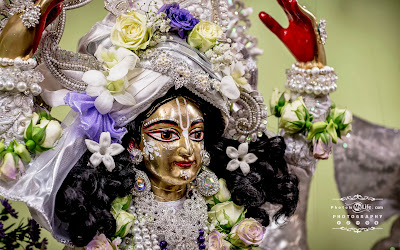
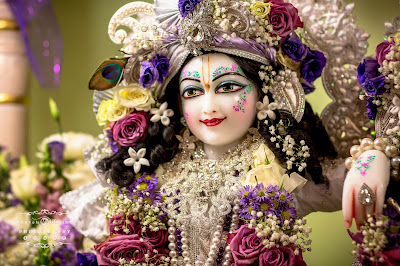
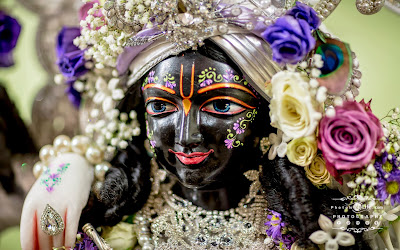





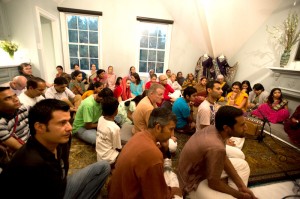
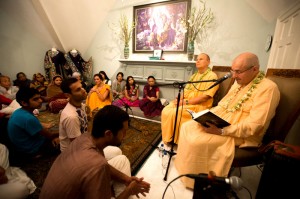
 Meanwhile, a new building in a different part of Leningradsky Prospekt has been rented and is being renovated for the Deities to move into by mid-October. The pujari (priest) department and the Deities’ kitchen, along with a temple room for daily programs, will also be included at this new location. Another building will be rented for Sunday programs.
Meanwhile, a new building in a different part of Leningradsky Prospekt has been rented and is being renovated for the Deities to move into by mid-October. The pujari (priest) department and the Deities’ kitchen, along with a temple room for daily programs, will also be included at this new location. Another building will be rented for Sunday programs.